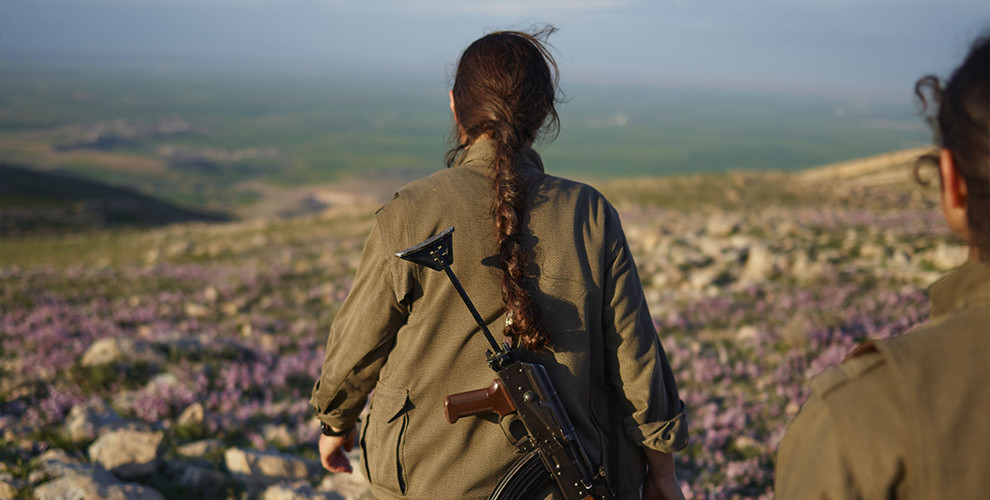The guerrilla makes the wounds invisible
When guerrilla fighter Sema loses her right hand, she concentrates on her left hand. The psychological superiority makes the physical wounds invisible. The attachment to life is strengthened by injuries.
When guerrilla fighter Sema loses her right hand, she concentrates on her left hand. The psychological superiority makes the physical wounds invisible. The attachment to life is strengthened by injuries.

We reach a guerrilla group of the HPG, while the May rains fall continuously on us. For days it has not stopped raining. The mud sticks on our shoes, every step is difficult for us. Two guerrilla fighters come towards us on the narrow path.
One of them is Sema Amed. Her curly hair is wet and her gun is held close to her body to protect it from the rain. We greet each other and descend together to their campsite. On the way, Sema always insists on helping us with our bags. I notice her right hand, which she has wrapped with a cloth. When we arrive and try to clean our muddy shoes, the sun breaks through the cloud cover and we start talking.
Sema has been with the guerrilla for ten years. She talks about her childhood in a village near Lice. Even as a child, the guerrilla was the greatest figure for her. At all games, she hoped that the guerrillas would join in and play along. When there was a quarrel with their friends, her eyes searched the paths in the hope that the guerrillas would come and make peace. The guerrilla was always present in her childhood dreams and she included them in her prayers. She knew adulthood would be a disaster, but she still wanted to grow fast to become a guerrilla fighter herself. "I wished so much that when I woke up, I sometimes felt like I had grown up," she says.
From the village to the mountains
Sema left her childhood behind and wanted to finally put her dreams into reality. She put her head together with two girlfriends from the village. One night it was time. They found a way and left the village into the mountains.
Our conversation is interrupted by a tea break. A worn old radio with several patched antenna is pulled out of its careful wrapping. Such devices are not easy to find in the guerilla, but daily news-listening is a ritual.
After the news they switch to the radio channels of Turkey. Immediately in the first news it says that so many "terrorists were neutralized" in the Medya Defense Zones within a week. The guerrilla fighters sit around the radio with their tea glasses and say: "Something is wrong with the mathematical calculations of this State. We are constantly being killed but we still exist. According to this balance sheet, we have all died long ago." The radio is then switched off.
Growing up with the mountains
Sema starts talking about the beauty of mountain life. "I am in the middle of the mountains of my childhood dreams and I am growing up with the mountains. In the past, the mountains of Amed seemed far away, and I did not know how big they actually are. Later you become one with them. Even if they look like they're immobile, they're growing every day."
When Sema takes the cloth from her hand, I see that she has lost part of her hand. In the mountains, wounds have a different meaning. You may lose a body part, but instead of moaning about it, the loss will cause you to fight even more. That's what they probably mean when they talk about growing with the mountains. When Sema lost her right hand, she concentrated on the left hand. She changed the habit of shooting with her right hand. Now she uses the left hand and her accuracy is as before. She also writes diaries with her left hand and her notebooks are full of notes she has made while reading books.
The guerrilla is a way of life in which no wounds are incurable. Wounds take away a body part, but they complete this dervish-like path. Psychological superiority makes physical wounds invisible. They do not take anything from man, they just let him grow, just like Sema. The wounds of the guerrillas do not lead to man turning away from life. They make the bond with life even stronger. All of them here make the impression that they can cope with every injury to protect the lives of their friends.